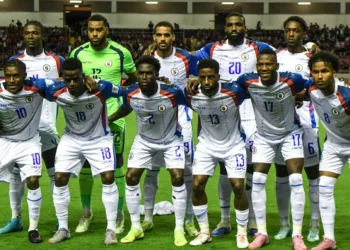Football in India is on the cusp of a transformative moment. The All India Football Federation (AIFF) has taken a monumental step by submitting an official bid to host the AFC Asian Cup 2031, signaling the nation’s growing ambitions in the world of international football.
Table of Contents
A Strategic Bid with Government Backing

The bid isn’t just another sporting aspiration – it’s a carefully orchestrated move backed by the highest levels of government. Union Minister for Youth Affairs and Sports, Dr. Mansukh Laxmanbhai Mandaviya, has thrown his full support behind the initiative, highlighting its significance beyond just a football tournament.
“Hosting major sporting events has a profound and lasting impact on a nation’s sports ecosystem and infrastructure,” Dr. Mandaviya emphasized, underlining the broader implications of the bid.
The Historical Context of Indian Football
To truly understand the significance of this bid, we must delve into the rich and complex history of football in India. Despite being overshadowed by cricket, football has deep roots in the country, particularly in states like West Bengal, Goa, and Kerala.
A Legacy of Passion
The love for football in India is not new. From the bustling streets of Kolkata to the coastal regions of Goa, the sport has always held a special place in the hearts of millions. The Mohun Bagan Athletic Club, founded in 1889, stands as a testament to the sport’s long-standing heritage in the country.
Why 2031? The Perfect Timing
AIFF President Kalyan Chaubey provided crucial insight into the timing of the bid. The 2027 tournament was deemed too soon, but 2031 offers a golden opportunity. With six years of preparation, India can meticulously plan and showcase its football infrastructure to the world.
Infrastructure Development: More Than Just Stadiums
Hosting the AFC Asian Cup goes beyond building stadiums. It’s about creating a comprehensive ecosystem for football:
- Training Facilities: World-class training centers for athletes
- Youth Development Programs: Structured pathways for young talents
- Technological Integration: Advanced sports science and analytics
- Urban Infrastructure: Improved transportation and hospitality
More Than Just a Tournament
This bid represents more than just hosting a football event. It’s a statement of India’s rising global sporting ambitions. The Asian Cup, being the continent’s premier football competition, would bring together footballing royalty from across Asia, putting India center stage.
Economic and Social Impact

The tournament has potential far beyond the sporting realm:
- Estimated economic boost of $500 million to $1 billion
- Creation of thousands of temporary and permanent jobs
- Global marketing opportunity for India’s tourism and infrastructure
- Potential to inspire millions of young athletes
Government’s Strategic Vision
The bid aligns perfectly with India’s broader sporting strategy. As Dr. Mandaviya noted, this follows the nation’s ambitious plans like the potential 2036 Olympics bid and previous Commonwealth Games hosting. Football, with its massive popularity in India, stands at the forefront of this sporting renaissance.
Challenges and Opportunities
While the bid is promising, it’s not without challenges:
- Improving current football infrastructure
- Developing a competitive national team
- Creating sustainable football culture
- Competing with established footballing nations
The Road Ahead
The Asian Football Confederation (AFC) has acknowledged India’s bid during its 35th Congress in Kuala Lumpur. A bidding workshop scheduled for later this month will be a crucial next step in this journey.
What This Means for Indian Football
- Infrastructure Development: Hosting such a major tournament will necessitate significant investments in sporting facilities.
- Global Exposure: A chance to showcase India’s footballing potential on a continental stage.
- Youth Inspiration: Potential to spark a new generation of football enthusiasts across the country.
- International Recognition: Positioning India as a serious footballing nation
The Bigger Picture
This bid is more than just a sporting event – it’s a testament to India’s growing confidence and capability on the international stage. It represents a strategic move to position the country as a serious contender in global sports.
Conclusion: A Dream in Motion

As India submits its official bid for the AFC Asian Cup 2031, the football world watches with anticipation. It’s not just about hosting a tournament – it’s about writing a new chapter in Indian sports history.
FAQ:-
How many football Asia Cups has India won?
The period saw the Indian football team win two Asian Games gold medals (1951 and 1962) and one bronze (1970). India also made their AFC Asian Cup debut in 1964 and finished runners-up — their best finish in the competition to date.
Is Indian football in FIFA?
Indian football’s FIFA Rankings: Analysing the rise and fall since 1992. India currently ranks 127 on the FIFA standings. The men’s Indian football team’s best ranking has been 94, achieved in February 1996. In world football, rankings are an important indicator.








